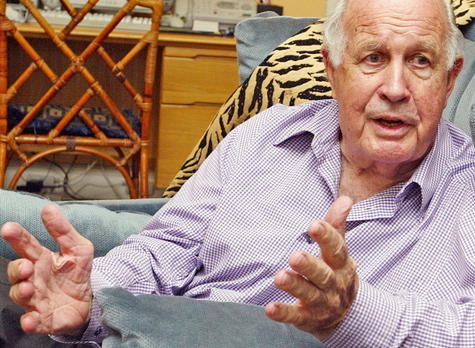As heads of state from around the world begin arriving in South Africa on Monday for the memorial and funeral to the late President Nelson Mandela, another great South African hero will be buried: Colin Eglin, the leader of parliamentary opposition to apartheid. It is unfortunate, and yet somehow appropriate, that Eglin’s own funeral would be overshadowed by Mandela’s–just as the small liberal opposition was long overshadowed by the ANC.
Eglin was a founder and leader of the Progressive Party, which resisted apartheid from within the South African political system. For many years, he and his colleagues, including the late Helen Suzman, were the only voices against racial segregation in South Africa. Ironically, by law, they had to restrict party membership to whites. It was a morally fraught position, just as as Mandela’s turn to violence and alliance with communism had been.
The Progressives (or “Progs,” as they were affectionately known) were a small minority until the 1980s, when they briefly led the parliamentary opposition. They later became the Democratic Party, which won less than two percent of the vote in South Africa’s first democratic election in 1994. Small though it was, however, Eglin’s party played a crucial role in shaping South Africa’s widely-heralded new constitution, which passed in 1996.
The South African constitution is a liberal one in the classical sense, with protections for individual liberties and checks and balances on government power. The document has its flaws: its socioeconomic rights enshrine big-government policies, and its separation of powers is too weak to contain the ambitions of the ruling party. Yet it is still a great achievement, considering that the main parties were not democratic but nationalist in character.
Eglin fought for, and could claim responsibility for, the liberties and constraints on power that survived the constitutional negotiations. As his successor, former opposition leader Tony Leon, said last week on Eglin’s passing, the constitutional negotiations had been “his finest hour,” where he had “played an immense and often unheralded role” in securing the future of freedom in a country on the brink, with an uncertain destiny.
The larger racial drama, and Cold War politics, often hid the fact that there was a small but active and effective non-communist opposition to apartheid in South Africa. They may not have won many votes, but they laid a foundation for the country’s transition and planted the seeds of loyal opposition in the post-apartheid era. Eglin’s funeral will be eclipsed by Mandela’s week of mourning. But his ideas will live on, ever more strongly.
Photo source: SA Mail & Guardian

COMMENTS
Please let us know if you're having issues with commenting.